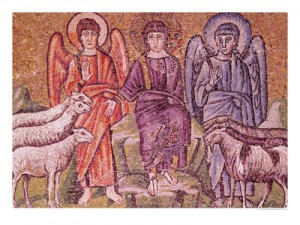Today in my Sunday school class we took a detour from Hebrews. Last time we had reached the phrase “eternal judgment” and the question came up of whom the author of the letter envisaged being judged, and on what basis. And so I suggested that taking a look at the parable of the sheep and the goats in Matthew 25.
 This parable is a serious problem for the sort of Christian theology which says that belief is what really matters, and that any focus on what people do is wrong-headed and displeasing to God, since it depicts Jesus saying the very opposite. The nations are brought before the king – and whether that is all nations (including Jews) or only Gentiles, it envisages their being judged based on their acts of compassion, on how they treated others.
This parable is a serious problem for the sort of Christian theology which says that belief is what really matters, and that any focus on what people do is wrong-headed and displeasing to God, since it depicts Jesus saying the very opposite. The nations are brought before the king – and whether that is all nations (including Jews) or only Gentiles, it envisages their being judged based on their acts of compassion, on how they treated others.
There is no real way that I can see to turn this into a passage that teaches either that all one needs to do to be saved is to believe. If anything, it suggests that all one needs to do to be saved is to feed the hungry, clothe the poor, visit the prisoner, and so on.
I remember as a teenager hearing a missionary comment about the Keith Green song “The Sheep and the Goats” that he didn’t like it because it emphasized works too much. I was shocked not only because I had not previously encountered a Christian who didn’t like Keith Green, but also because it seemed to raise the question of whether it was not in fact the underlying parable that the individual in question disagreed with.
 Today I see matters as much more complex than I realized them to be then. Matthew 25:31-46 is material that is found only in the Gospel of Matthew, and it has features characteristic of that author. And so one cannot avoid asking whether the parable in any form goes back to Jesus. Likewise one has to ask whether, on this point, Matthew agreed or disagreed with other New Testament authors – writings attributed to Paul, James, and John, in particular.
Today I see matters as much more complex than I realized them to be then. Matthew 25:31-46 is material that is found only in the Gospel of Matthew, and it has features characteristic of that author. And so one cannot avoid asking whether the parable in any form goes back to Jesus. Likewise one has to ask whether, on this point, Matthew agreed or disagreed with other New Testament authors – writings attributed to Paul, James, and John, in particular.
The text should not be neutralized by the approach called “interpreting Scripture in light of Scripture,” which is another name for saying “This text says X, which is what I believe, and therefore another text cannot say Y which would disagree with X.” That is just a convenient way of justifying ignoring material one dislikes. Better to be honest that there is a tension, and find a creative way to live with the tension.
For some of us, of course, this passage emphasizes things that we consider important, and it is other texts in the New Testament where we need to avoid ignoring or neutralizing.
 Ultimately, the whole reason for having a New Testament is to have a collection of voices that connect us with the earliest days of Christianity, with a time before the phenomenon even had that name. We may ultimately decide that we need to believe, practice, and/or emphasize different things than those ancient authors did. Indeed, we cannot help but do that. But we ignore them at our peril, just as we put ourselves at risk if we only surround ourselves with people who say things that we already agree with.
Ultimately, the whole reason for having a New Testament is to have a collection of voices that connect us with the earliest days of Christianity, with a time before the phenomenon even had that name. We may ultimately decide that we need to believe, practice, and/or emphasize different things than those ancient authors did. Indeed, we cannot help but do that. But we ignore them at our peril, just as we put ourselves at risk if we only surround ourselves with people who say things that we already agree with.
What is your understanding of the parable of the sheep and the goats? Have you ever encountered a serious, perhaps even a persuasive, attempt to reconcile it to the Protestant emphasis on grace alone?
For those who may not know it, here’s the Keith Green song I referred to earlier:












